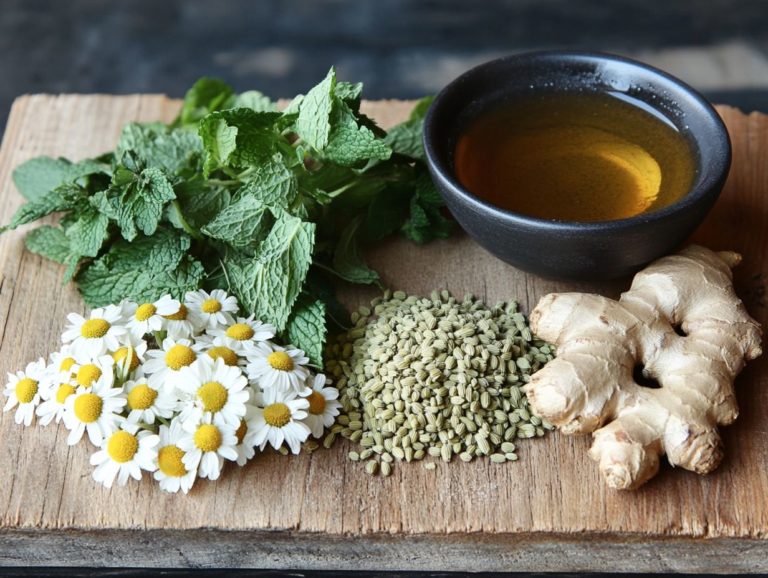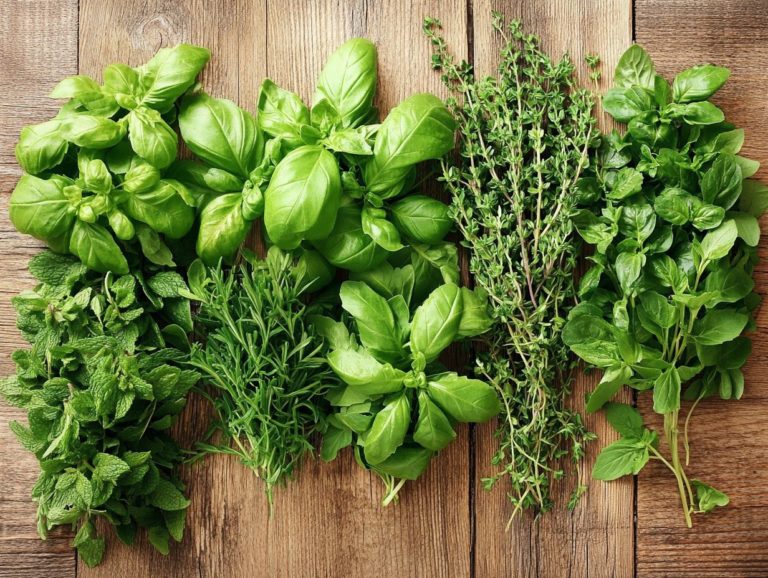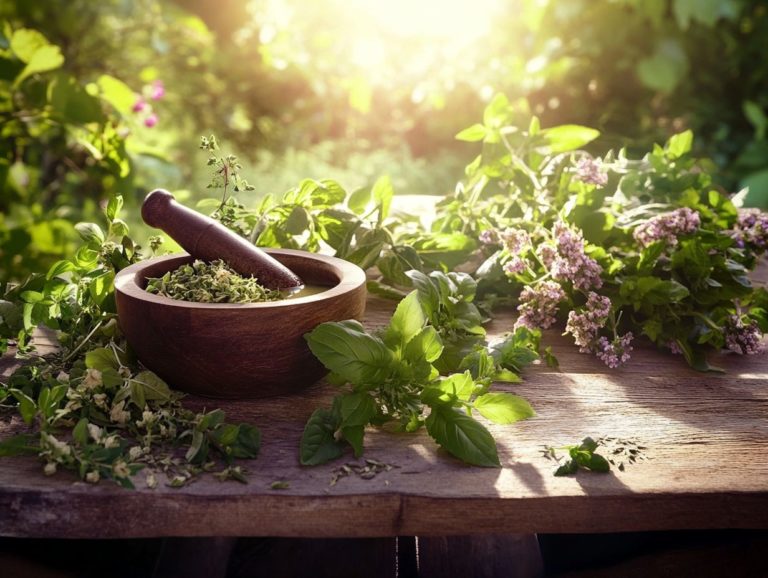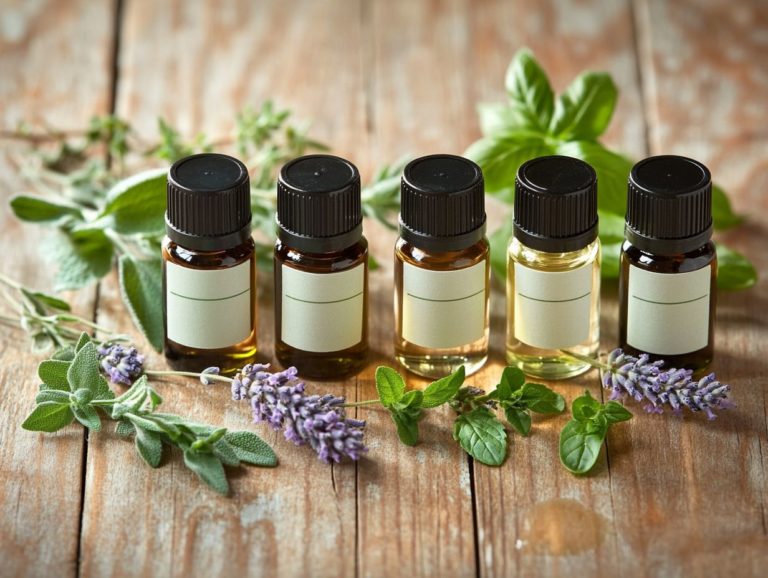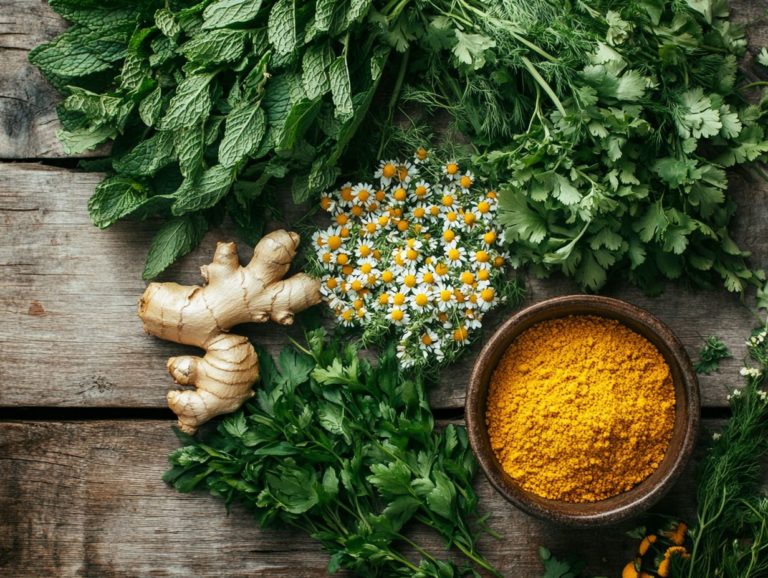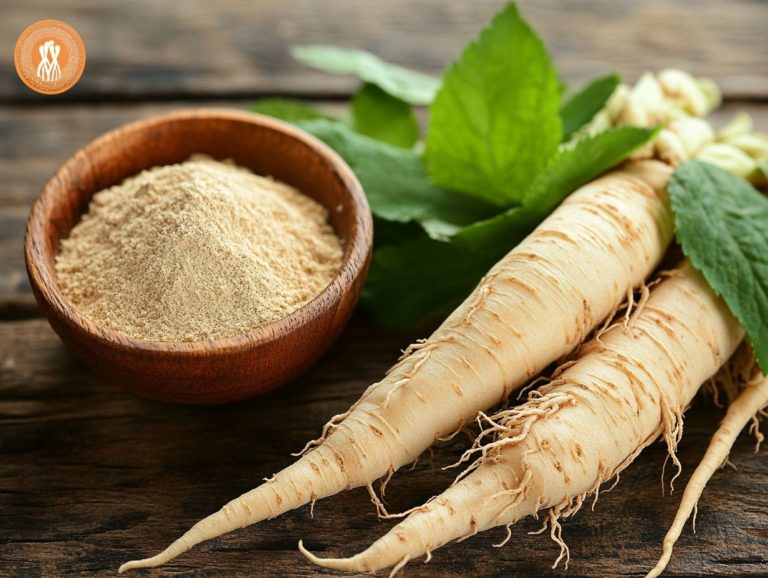Herbal Teas: Nature’s Soothing Elixirs
Herbal teas have long been known for their calming effects and health benefits, presenting a delightful alternative to conventional beverages.
This exploration delves into the captivating world of herbal teas, highlighting their numerous health advantages and the diverse types available.
You ll definitely find something exciting that interests you!
Contents
- Key Takeaways:
- Benefits of Herbal Teas
- Types of Herbal Teas
- How to Brew the Perfect Cup of Herbal Tea
- Potential Risks and Side Effects
- Incorporating Herbal Teas into Your Daily Routine
- Frequently Asked Questions
- What are herbal teas and why are they considered nature’s soothing elixirs?
- What are some common types of herbal teas?
- Can herbal teas be used for medicinal purposes?
- Are there any potential side effects of drinking herbal teas?
- How should herbal teas be prepared for maximum benefits?
- Can herbal teas be enjoyed hot or cold?
Key Takeaways:
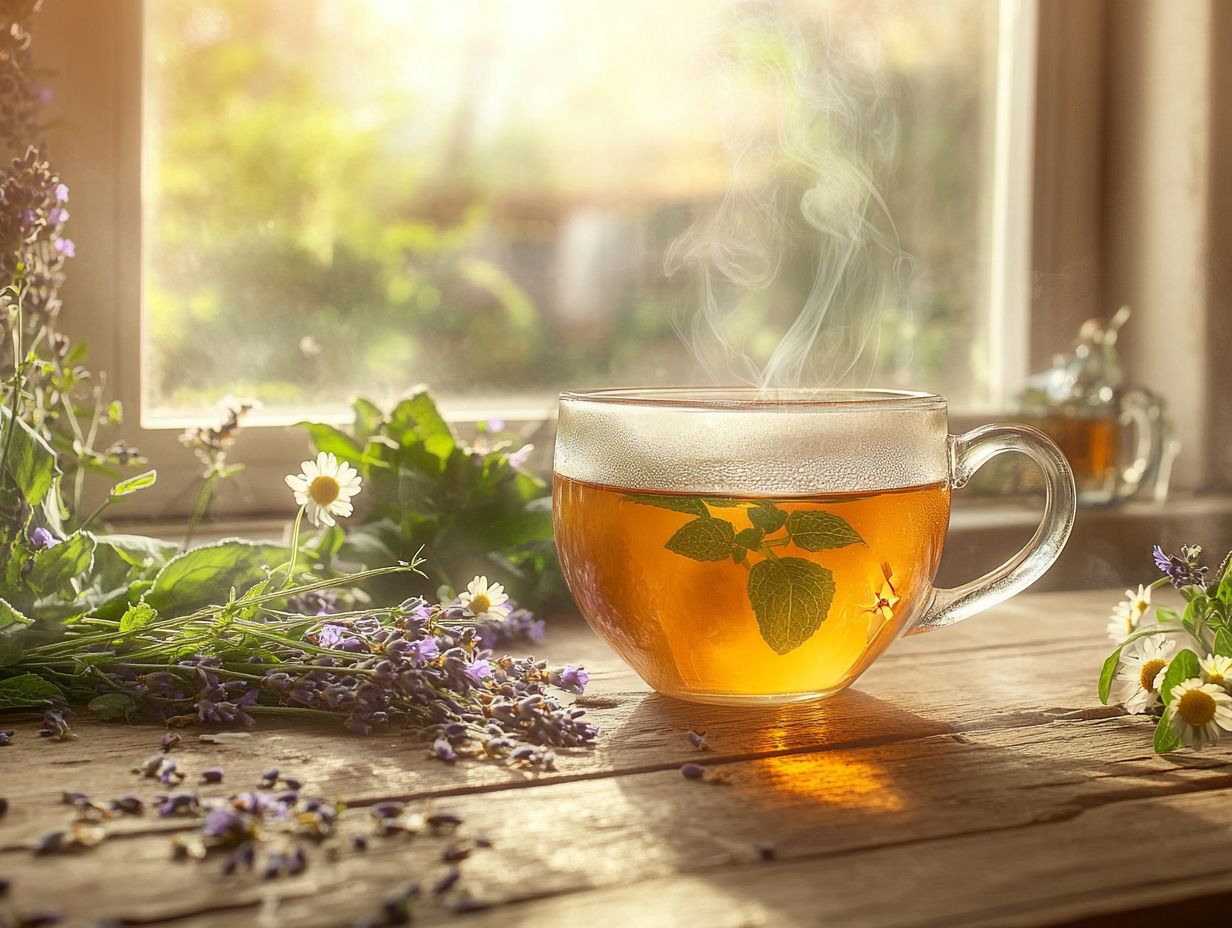
- Herbal teas offer a natural and soothing way to improve overall health and well-being.
- With a variety of flavors and health benefits, there’s an herbal tea for everyone to enjoy.
- Incorporate herbal teas into your daily routine and start enjoying the benefits today!
What are Herbal Teas?
Herbal teas, often called herbal infusions, are delightful beverages crafted from the leaves, flowers, seeds, or roots of various plants. They are known for their calming effects and health benefits. Unlike black or green teas, herbal teas are entirely caffeine-free, allowing you to savor them any time of day, making them an important part of your health routine.
Unique blends, like Mullein tea, derived from the soft, velvety leaves and striking yellow flowers of the Mullein plant, offer potential health advantages deeply embedded in traditional medicinal practices.
Herbal teas have a rich history, tracing their roots back to ancient civilizations like those of the Mediterranean and Native American tribes, underscoring their significance in natural health remedies.
Beyond Mullein, you have other remarkable options like:
- Peppermint, known for its digestive benefits,
- Chamomile, known for helping you sleep better,
- Echinacea, well-regarded for boosting immune defense,
- Ginger, a trusted ally for combating nausea and respiratory issues.
These herbal beverages do more than provide comfort; they connect you to age-old traditions and weave healing practices into your daily rituals. As the quest for holistic health solutions gains momentum, understanding the rich history and diverse benefits of herbal teas becomes essential for anyone looking to enhance their wellness journey.
Benefits of Herbal Teas
Herbal teas present a wealth of health benefits tailored to various concerns. They establish themselves as important parts of your health routine. These natural brews not only boost your immune system but also aid digestion. They offer soothing effects that can help alleviate stress and enhance your overall well-being.
Varieties like mullein tea and chamomile are renowned for their calming properties. Meanwhile, hibiscus and peppermint offer unique flavor profiles along with their health perks. With such a diverse array of herbal tea options available, you re sure to find a blend that perfectly matches your taste and health needs.
Common Health Benefits
- Anti-inflammatory properties: Help reduce swelling and pain.
- Immune support: Strengthens your body’s defenses.
- Digestive aid: Helps alleviate digestive issues.
Take Mullein tea, for instance; it s particularly revered for its soothing effects on respiratory health, helping to alleviate symptoms associated with colds and allergies. Herbal infusions pack antioxidants, contributing to your overall well-being by combating oxidative stress. Other varieties promote digestive health and relaxation, ideal for enhancing any wellness routine.
Consider chamomile tea, known for its calming effects. It s often your go-to when battling insomnia and anxiety, perfect for those restless nights. On the flip side, peppermint tea offers delightful refreshment while effectively soothing digestive issues and headaches, thanks to its muscle-relaxing properties.
By exploring the unique benefits of these herbal brews, you can tailor your tea choices to address specific health concerns, enriching your wellness journey in a natural and enjoyable way.
Types of Herbal Teas
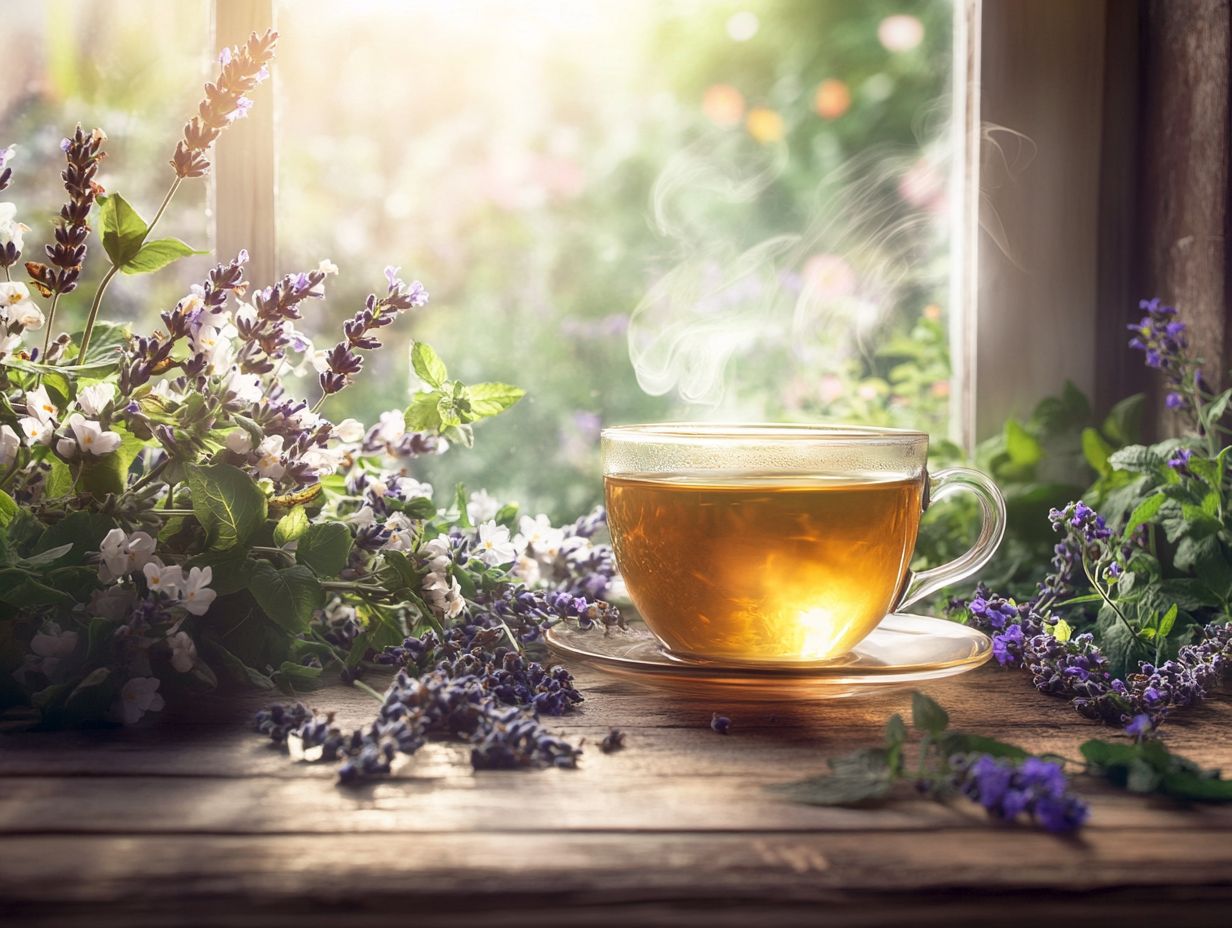
Dive into the world of herbal teas today! Discover a variety of flavors that not only please your palate but also nurture your health.
Consider the delights of Mullein tea, celebrated for its respiratory benefits. Or enjoy the soothing embrace of chamomile, perfect for unwinding after a long day. Peppermint, with its invigorating qualities, provides a gentle boost for your digestive system.
Each herbal infusion offers distinctive flavor profiles and brings its own health-enhancing properties. You can savor these teas on their own or combine them with delightful additions like lavender or elderberry, elevating both their taste and therapeutic benefits.
Overview of Popular Herbal Tea Varieties
Popular herbal tea varieties include Mullein, chamomile, lavender, peppermint, elderberry, and hibiscus, each bringing its unique flavors and health benefits to your cup.
Take Mullein tea, for instance. Often hailed as a traditional remedy, it s not just soothing; it can help with coughs and breathing issues, making it your go-to during those chilly seasons. Chamomile, with its delicate floral notes, offers a comforting embrace that promotes better sleep and reduces anxiety perfect for unwinding after a long day.
Then there’s peppermint, whose refreshing flavor invigorates your senses while aiding digestion and alleviating headaches. Lavender tea, with its sweet aroma, acts as a natural relaxant, enhancing your overall mood. Elderberry is a powerhouse, particularly brewed during flu season, packed with vitamins and antioxidants to support a robust immune system. And let s not forget hibiscus, which stands out with its tartness and vibrant color, offering benefits that may help lower blood pressure and improve heart health.
Together, these herbal varieties tantalize your taste buds and serve as natural allies in your quest for well-being.
How to Brew the Perfect Cup of Herbal Tea
To brew the perfect herbal tea, pay attention to details. Start by selecting high-quality Mullein tea or your favorite herbal infusion, using fresh, filtered water that has been brought to a boil. This will help unlock the full flavor and health benefits.
Whether you opt for a tea bag or loose leaves, remember that steeping time varies depending on the herb, typically falling between 5 to 10 minutes. The result? A flavorful and aromatic cup that can be savored on its own or elevated with natural sweeteners like honey, enhancing its overall allure.
Tips and Tricks for Brewing
Mastering the art of brewing herbal tea is a journey filled with techniques that elevate both flavor and health benefits, ensuring a truly delightful experience. To brew Mullein tea or any herbal infusion, begin by selecting the right brewing temperature generally around 200 F to effectively extract the flavors and medicinal properties.
Pay close attention to the steeping time, as it can dramatically influence the taste; for Mullein tea, a steeping period of about 5 to 10 minutes will yield the desired strength. Don’t hesitate to experiment with different brewing methods to uncover the perfect balance that suits your palate.
Adding elements like fresh herbs, spices, or even a splash of citrus can transform a simple herbal brew into a bespoke beverage that invigorates the senses. Prioritize the quality of the herbs you use; opting for whole leaf forms over pre-packaged options will ensure a richer flavor and optimal extraction of healthful compounds.
Depending on your personal preference, you might find joy in blending teas consider combining chamomile and lavender for a calming experience.
Track your brewing adventures in a journal! Each note will guide you toward your perfect herbal tea blend.
Potential Risks and Side Effects
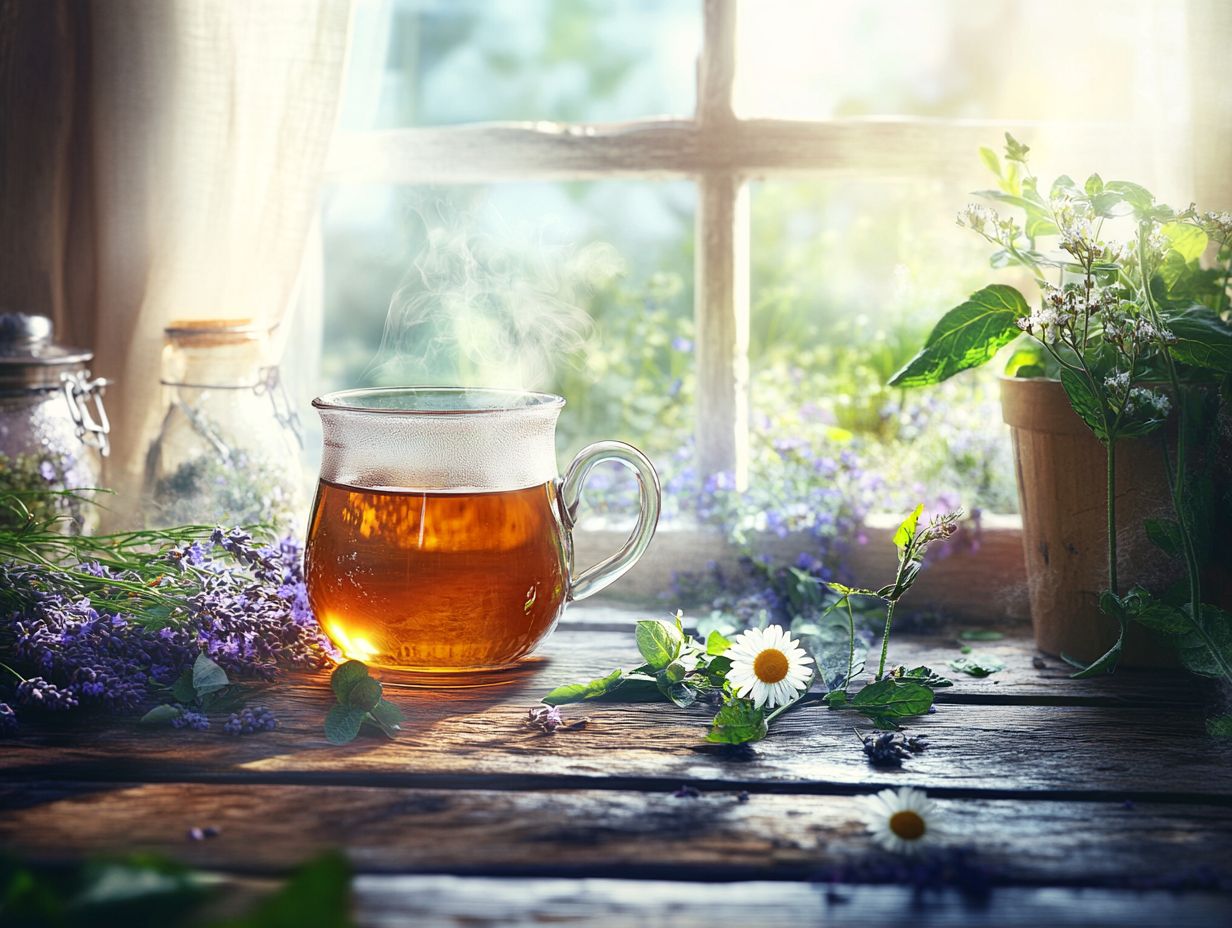
While herbal teas, including Mullein tea, are typically safe for most individuals, it s crucial to stay aware of the potential risks and side effects associated with their consumption.
Some herbal teas can interact with medications, leading to health concerns that require a discussion with a healthcare professional. Drinking excessive amounts of Mullein tea may cause digestive upset, and some people could experience allergic reactions to specific herbs.
By understanding these potential risks, you can ensure a safe and enjoyable experience with herbal teas.
Precautions to Consider
When you enjoy herbal teas like Mullein tea, it s important to take precautions to prevent adverse reactions and ensure your safety.
Herbal teas can be full of beneficial compounds, but staying mindful of their effects is key, especially if you have a history of allergies. Research thoroughly or perform patch tests applying a small amount of herbal tea to your skin to check for allergic reactions before fully embracing new herbal options in your diet.
If you have digestive disorders, consult healthcare professionals before trying herbal teas that might interact negatively with your condition or medication. These proactive measures enhance your experience and help minimize the risk of discomfort or unexpected reactions, allowing you to enjoy these natural beverages in a healthier way.
Incorporating Herbal Teas into Your Daily Routine
Incorporating herbal teas into your daily routine can elevate your wellness journey, offering comfort and numerous health benefits without the caffeine kick of regular teas.
Imagine Mullein tea as your soothing companion for a calming bedtime ritual, while chamomile and lavender teas provide relaxation after a long day. These caffeine-free drinks fit easily into any lifestyle, whether you enjoy them in the morning to refresh your senses or in the evening to wind down.
Discover fun ways to weave these herbal teas into your everyday life and unlock their full range of benefits.
Creative Ways to Enjoy Herbal Teas
There are countless creative ways to enjoy herbal teas, moving beyond the traditional steeped cup to delicious dishes and refreshing iced versions. Consider adding Mullein tea to smoothies for an extra health boost, or using herbal teas as a flavorful base for salad dressings or marinades.
Iced herbal tea offers a delightful summer refreshment, delivering flavor and health benefits without the caffeine kick. By experimenting with different methods to enjoy herbal teas, you open up a world rich in flavors and wellness.
Blend Mullein tea with citrus fruits for a refreshing iced drink or use it in popsicle recipes for a cool treat on hot days. If you love baking, consider adding herbal teas to muffins or cakes to add a unique twist and depth of flavor. Using Mullein tea as a base for homemade syrups can elevate your cocktails or mocktails, introducing a complex herbal note that s sure to impress.
The versatility of herbal teas invites you to explore exciting new ways to incorporate them into your daily routine, transforming wellness into a delicious experience.
Frequently Asked Questions
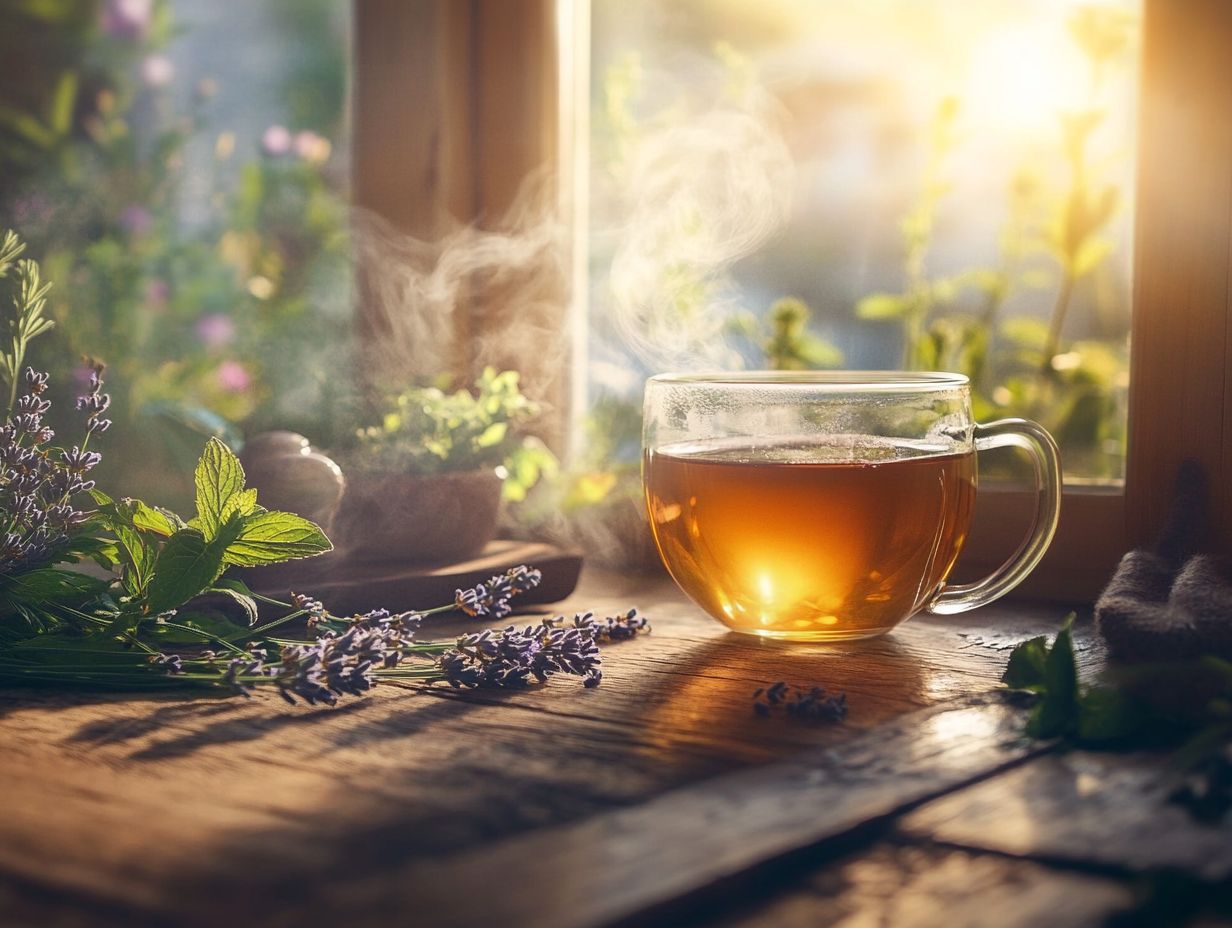
What are herbal teas and why are they considered nature’s soothing elixirs?
Herbal teas are beverages made from dried herbs, flowers, fruits, or spices steeped in hot water. They are considered nature’s soothing elixirs because they offer various health benefits, such as calming the mind and body, boosting the immune system, and aiding digestion.
What are some common types of herbal teas?
Some common types of herbal teas include chamomile, peppermint, ginger, lemon balm, and hibiscus. Each type offers its unique flavor and health benefits.
Can herbal teas be used for medicinal purposes?
Yes, herbal teas have been used for centuries for their medicinal properties. They can help alleviate symptoms of various ailments, such as headaches, colds, and digestive issues.
Are there any potential side effects of drinking herbal teas?
Herbal teas are generally safe, but it’s wise to check with a healthcare professional before trying a new one. This is especially important if you have existing health conditions or take medication, as some herbs can interact with meds or cause allergies.
How should herbal teas be prepared for maximum benefits?
To maximize benefits, steep the herbs in hot water for at least 5 minutes. This releases the flavors and health benefits, but some teas may need longer steeping, so always check the packaging for instructions.
Can herbal teas be enjoyed hot or cold?
Absolutely! Herbal teas are delightful both hot and cold. Hot tea creates a cozy atmosphere, while iced herbal tea is a refreshing treat on warm days. Don t forget to add a splash of honey, a squeeze of lemon, or your favorite sweetener for an extra burst of flavor!

